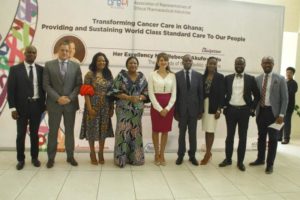Let’s all come together to fight cancers – First Lady
 The First Lady, Mrs Rebecca Akufo-Addo, has called on all stakeholders to come together to fight cancers plaguing Ghana and Africa.
The First Lady, Mrs Rebecca Akufo-Addo, has called on all stakeholders to come together to fight cancers plaguing Ghana and Africa.
“No one person can do it. There must be synergy between academia, healthcare practitioners, civil society organisations, drug companies, governments, payers, the patients and many others,” she said.
“We must each play our roles, while complementing the roles of other stakeholders. In this battle we are all on one side with a common enemy.”
“If we must win, we have to come together and work together.”
Mrs Akufo-Addo was speaking at a cancer conference in Accra, which was organised by the Association of Representatives of Ethical Pharmaceutical Industries, a body of multinational pharmaceutical companies operating in Ghana, in collaboration with the Union for International Cancer Control (UICC), the biggest global cancer fighting organisation.
Access Accelerated, made up of bio-pharmaceutical companies committed to tackling the growing burden of non-communicable diseases in low and middle-income countries also supported the conference.
It was organised as part of activities marking this year’s World Cancer Day, observed on February 4, every year, and attended by Princess Dina Mired, Princess of Jordan and President of UICC.
Other stakeholders across the cancer landscape including officials from the Ministry of Health, Ghana Health Service, oncologists, surgeons and patient groups also attended to discuss pertinent issues relating to cancer.
Mrs Akufo-Addo said the country needed to invest in financing and training of more healthcare professionals to acquire the needed skills to manage cancer cases.
The National Strategy for Cancer Control 2014-2017 indicates that seven out of 10 women diagnosed with breast cancer each year in Ghana will die from it compared to two out of 10 women in developed countries like United States of America.
Prostate Cancer is said to similarly devastating Ghanaian men, while childhood cancers are also killing many Ghanaian children.
A 2018, publication by the International Agency for Research on Cancer also states that almost 23,000 cases of new cancers are recorded annually in Ghana.
Out of the number, more than 15,000 people die every year.
Mrs Akufo-Addo called for intensified awareness creation on all types of cancers at all times and with every given opportunity, saying, “We cannot rest or be tired of speaking about cancers, until we see all relevant stakeholders, taking the appropriate actions to help deal with the challenge of all forms of the disease.
She expressed regret that most often people could not afford cancer treatment, and so there was the need for a stakeholder consultation on proper financing mechanism of cancer treatment in the country to help provide quality care for patients who suffer from it.
“Today cancer is a problem, but it doesn’t have to remain so. We have everything it takes to overcome it. I have hope and so should you.”
“Let’s continue to innovate and think differently, about how we do things and I am sure that very soon we shall come back here, pat ourselves on the shoulder and say we took on cancer and we won.”
Princess Dina Mired, on her part, expressed regret that cancer deaths were increasing, especially in Africa, while in other countries there were no deaths with cancers.
She emphasized that access to quality care as well as prevention and awareness creation were critical measures needed to stop cancer deaths.
She urged people to change their lifestyles of eating junk food, and avoid cancer stigmatization, while governments must also put in the needed regulations backed by political actions to aid cancer control.
Dr Joel Yarney, a Radiation Oncologist at the Korle-Bu Teaching Hospital, said five per cent of Ghana’s population now suffered from all forms of cancers, which were parts of non-communicable diseases, having increased among Ghanaians lately.
He, therefore, advised Ghanaians to live healthy lives, eat well and seek regular medical care to make them live healthy long lives.
Source: GNA
